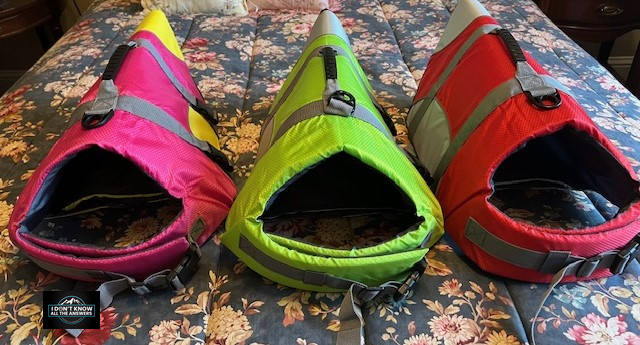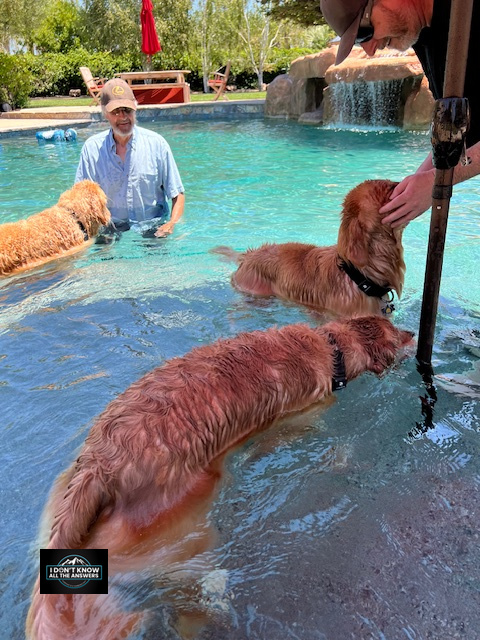The Allure of Canine Aquatics
If you’ve ever witnessed the sheer joy and freedom a dog experiences while paddling through the water, you know the magic of it. Seeing our furry friends making a splash, their tails wagging in pure delight is truly enchanting. But here’s a fascinating fact: all dogs are natural swimmers. Swimming is almost second nature for some breeds, like Golden Retrievers, Labrador Retrievers, and Portuguese Water Dogs. I can’t say that was the case for my three Golden Retrievers.
In this blog post, I’ll explore the natural swimming instincts of these exceptional breeds, the unique physical traits that make them excel in the water, and how you can safely introduce your dog to swimming. Whether you’re a dog owner, animal lover, or one of my blog followers, you’ll find valuable insights to help your canine companion enjoy the water safely and confidently.
The Natural Swimmers
Instincts and Heritage
Golden Retrievers, Labrador Retrievers, and Portuguese Water Dogs have a rich history intertwined with water. These breeds were initially developed for tasks such as retrieving games from water and assisting fishermen. This heritage has instilled strong swimming instincts in these dogs, making them natural-born swimmers.
Physical Attributes for Swimming
What makes these breeds exceptional swimmers? It’s all in their physical traits:
- Water-Resistant Coats: Both Golden Retrievers and Labradors have water-resistant coats that help them stay buoyant and warm in the water.
- Webbed Feet: The webbing between their toes acts like natural paddles, allowing them to swim efficiently.
- Muscular Bodies: Their solid and muscular builds provide the power to swim long distances.
The Importance of Early Introduction
Just like humans, dogs benefit greatly from early and positive experiences with water. Introducing your puppy to water at a young age can lay the groundwork for a lifetime of enjoyable swimming, building their confidence, and making water a fun and familiar environment.
Note: My dogs were not introduced to swimming at an early age. Teddy is five years old, Summer is two years old, and Bear is one year old.
Tips for Positive Water Experiences
- Gradual Acclimatization: Start by introducing your dog to shallow water, allowing them to get comfortable with the sensation of water on their paws.
- Positive Reinforcement: Use treats, toys, and verbal praise to associate water and swimming positively.
- Leash and Guidance: In the initial stages, use a leash to guide your dog into the water and provide support if needed.
- Gentle Encouragement: Speak calmly and reassuringly to encourage your dog to venture further into the water at their own pace.
- Patience and Consistency: Every dog learns quickly. Be patient and consistent with training sessions, gradually moving into deeper water as your dog becomes more confident.
- Supervision: Always supervise your dog closely in or near water to ensure their safety and comfort.
- Professional Assistance: For more challenging cases, consider enlisting the help of a professional dog trainer experienced in water introductions.
Safety First
The Role of Life Jackets
Even strong swimmers can benefit from the added safety of a life jacket, particularly in unfamiliar or rough waters. A well-fitted life jacket provides:
- Buoyancy.
- Making it easier for your dog to stay afloat and reducing the risk of fatigue.
- Ensuring a safer and more enjoyable swimming experience.
Supervised Swims and Water Hazards
Always supervise your dog while they are swimming. Be aware of hazards such as strong currents, sharp objects, or toxic algae. A safe environment ensures a fun and worry-free swimming experience.
The Benefits of Canine Swimming
Physical Exercise and Joint Health
Swimming is an excellent, low-impact exercise for dogs. It helps build muscle and improve cardiovascular health. It is especially beneficial for dogs with joint issues, as it reduces limb stress.
Mental Stimulation and Confidence Building
Swimming isn’t just about physical exercise for dogs. It also offers a unique form of mental stimulation, providing an exciting change of pace from regular walks and playtime. It can help build their confidence, alleviate boredom, and reduce anxiety, fostering a sense of adventure and exploration in a safe and controlled environment.
My Real-Life Experience
Neither Teddy, Bear, nor Summer, Golden Retrievers, leaped into the water as I thought they might. In fact, all three were very cautious. Teddy was the first to take a paw step into the pool. Luckily, our pool has a shallow ledge called a “Sun Shelf,” so Teddy could walk around and gain confidence. Summer was the next to venture in, and she seemed to have the most confidence. Poor little Bear was fearful, and Anthony had to pick him up and put him gently in the water. But like when they are not in the pool, Bear and Summer eventually walked around on the shallow shelf together. Their first experience in the water was very positive, and they had a good time.

Conclusion:
Encouragement for Dog Owners
Encourage your furry friend to take the plunge! Swimming can be a fantastic bonding experience and an excellent way to keep your dog healthy and happy. Remember, patience and positivity are key.
My Final Thoughts on the Unique Bond Between Dogs
There’s something heartwarming about seeing your dog thrive in the water, their happiness palpable. By nurturing their swimming skills, you’re not just teaching them a new activity but enriching their life and strengthening your bond.
Ready to introduce your dog to the joys of swimming? Start slow, stay safe, and watch your dog become a confident swimmer. Happy splashing!
References:
What Are the 7 Commands to Train a Dog? | DogNotice. https://dognotice.com/what-are-the-7-commands-to-train-a-dog/
Pool Safety for Dogs – Tips for Pet Parents | PawBoost. https://www.pawboost.com/blog/pool-safety-for-pets-how-to-prevent-pool-danger-for-pets/
Top Enrichment Activities for your Dogs – About Dog Training. https://www.about-dogtraining.com/top-enrichment-activities-for-your-dogs/
Doggie Beach Bash at NRH2O. https://www.katiekinsley.com/doggie-beach-bash-at-nrh2o/?utm_source=hovelsweethovel.com&utm_medium=referral&utm_campaign=gift-guide-for-pet-owners
Tactile Sensory Board | mysite. https://www.amazingsensorydesigns.com/product-page/tactile-sensory-board-1
Salmon Dog Food – Elm Pet Food. https://elmpetfoods.com/products/salmon-dog-food-28-lb
Thank you for reading this blog post. If you have any questions or comments, please leave them in the Comments section below.
Copyright © 2019. I Don’t Know All The Answers, Nikki Mastro.
All of my photographs and documents are Copyrighted.
No part of this website, including text, photographs, and documents, may be reproduced, stored in a retrieval system, or transmitted in any form or by any means without written permission from the copyright holder. All unauthorized use is strictly prohibited. If you choose to copy or share any information from my site, you must provide a link to the source. I appreciate your cooperation.
For further information concerning “I Don’t Know All The Answers.”
– Website and Blog: https://www.idontknowalltheanswers.com
– Facebook: https://www.facebook.com/Nikki.L.Mastro/
– Instagram: https://www.instagram.com/i_dont_know_all_the_answers/
– Linkedin: https://www.linkedin.com/in/nikki-mastro-05455a3a/
– Youtube Channel: https://www.youtube.com/@idontknowalltheanswers1954

